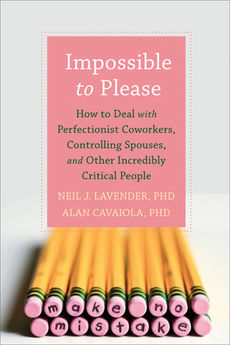Personality
Do Codependents Make the Best or Worst Employees?
Codedpendents can be the best, ahem and yes, and the worst employees.
Posted April 9, 2014

By Neil J. Lavender, PH.D.
During her initial interview, she looked shy and nervous, but as the interview wore on, she seemed to be unusually open and friendly; like an old friend, surely you have met before. She may have even brought in a cup of coffee or your favorite doughnuts (How could she know I love Cinnabon??). She makes you feel so comfortable; like an old pair of your favorite sneakers. There is an ease about her, a responsiveness to your every word; she seems to like you immediately and you find her sooooooooo easy to talk with.
Of course she is hired, she is soon recognized as a super conscientious employee. Not real creative, but thorough and reliable. Doesn’t mind doing routine jobs; good with details. Seems to need a fair amount of guidance and reassurance, however, but she doesn’t mind working late hours, heck, she even volunteers for it! And she is always so cheery and, well, so nice! She leaves you little notes with smiley faces with chocolate kisses on them and always reminds you of your meetings and other obligations even the personal ones. Seeming to anticipate your every need, she remembers it is your wife’s birthday and reminds you to buy her a gift. She’ll even pick it up for you on her way home if you wish. Oh, that’s OK; she will use her own money. You can reimburse her “whenever”.
At this point in time you find you are asking yourself, So, who is this person, and where can I find several dozen of them?
But, alas, the story continues. . .
As time goes on, she seems a little quiet but she won’t tell you why. She is a little short with you and not her usually friendly self. Is it something you did? You ask her and she says no. Soon she begins to take days off and she seems to be sick a lot. She is not quite as productive as she once was. She seems unusually inept and balks at learning “the new billing system”. And no more Christmas gifts. She is no longer interested in the birthday club. No more smiley faces on the memos. Worse yet and unbeknownst to you, she is secretly looking for another job.
If you could be a fly on the wall during her daily conversations with her sister you would hear her complain that she feels unappreciated at work. Nobody returned her Christmas cards. Nobody remembered her birthday. No one seems to appreciate any more that she works late, have they just gotten used to her and are taking her for granted? Worse yet, she thinks, maybe they just don’t like her. Are they mad at her? Why is it that she remembers everyone else’s favorite coffee (and spends her hard earned money to buy it for them) when they don’t reciprocate? She is the hardest worker in the office yet has not had a raise in months. They call on her when they need her but it is Jessica, the office flirt, who just got the most recent promotion. Tearful and distraught, she tells her sister that she is sending out her resume.
Although it is difficult for the average person to make a clinical psychological diagnosis in this case, it seems likely that this person has a dependent personality style and perhaps, if the behavior is deleterious to the individual and others and persists, this is most likely a person with Dependent Personality Disorder. More popularly referred to as co-dependent, this individual often seems “too good to be true.” And, when this personality style is not very extreme, they truly can be exceptional employees, hardworking and loyal; true members of the corporate family. Yet, as we just saw, they present a special challenge to the workplace. The key to managing them effectively lies to understanding what makes them tick.
Here are some tips: The key to managing a person with dependent personality disorder lies in management’s awareness of their unique gifts and imperfections. First and foremost, one needs to understand that they are in almost constant need of approval. They seem to anticipate your every need so that you will like them. They will give you gifts, so you will approve of them, they will do unpleasant jobs so you will approve of them. They will agree with you, so you will approve of them. They will try to be the perfect employee so that you will approve of them. They are simply horrified of rejection and disapproval; they even see it when it is not there.
They will tell you what you want to hear in order to avoid confrontations so it's tough to find out what they really want. Beneath the pleasantness and desire to acquiesce, there is a strong need to avoid disagreement. Remember, if you disagree with them, you might not like them and therefore will reject them. This leads to their doing things they don’t like, but not letting you know. Don’t be afraid to question them after their acquiescence with questions such as “But tell me, is there anything you don’t like about this?
Other suggestions? Try to understand that a little understanding and special pampering go a long, long way. You’ll need to spend “special time” talking with them about their work; they are very relational. In fact, use them in hospitality roles, or let them order food for meetings etc. And getting along with her coworkers is what will make her want to stay and be a part of her team.
Verbal expressions of appreciation and encouragement, while helpful for all employees are especially important to them. Also remember that raises and promotions, even if they are just tokens of appreciation, will keep this employee content and productive. Sometimes doing extra special things such as throwing them a little birthday party or giving extra time and encouragement when training them to learn new tasks or, even if they are just having a” bad hair day”, are all critical management behaviors for the dependent employee.
Remember, they have a strong need to have others direct them. They are afraid to make decisions by themselves. They’re afraid that if they do, they will be wrong. These are “paint by the numbers” people who do not like to wander too far off the beaten path. They like routine tasks, so why not give them these types of tasks to do?
It is true that when, when handled with care, these folks make great and loyal employees and coworkers. You just have to know how to treat them. And then they can really be “the best employees!"
Dr. Lavender is coauthor of Toxic Coworkers . . .and Impossible to Please. . .






